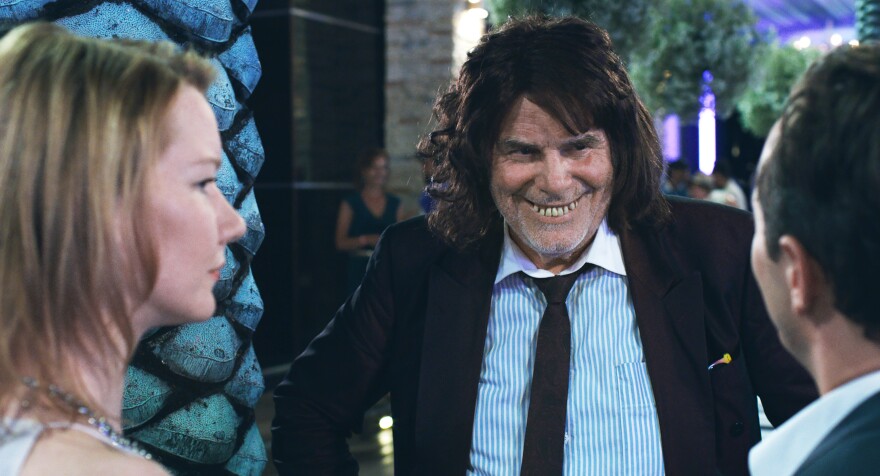Maran Ade’s Toni Erdmann is one of the most genuinely and deliberately awkward movies I’ve ever seen. It has moments where the characters look like they’re frozen in place, befuddled by their situations and wondering what to do. The picture can be absurd, or ridiculous, and in its best moments it feels something like ineffable. And then, at other times, Toni Erdmann is so tender it can break your heart.
The first time you see Winfried (Peter Simonischek), he’s making random, confusing comments to a guy trying to deliver a package. Winfried is a heavy set shaggy guy of about 60 with a mop of gray hair and a five-day beard. Winfried says he has to get his brother who is shy and has been in prison for sending letter bombs, and after a moment, Winfried emerges bumbling with dark sunglasses, a dark-haired wig and fake teeth that make him look somewhat threatening, but more than that deranged. Winfried calls himself in this getup Toni Erdmann. A bit later, he’ll visit his mother wearing smeary whiteface makeup, mumbling about his new job which involves killing residents at her assisted living home.
At the root of the matter is Winfried’s fraught relationship with his daughter Ines (Sandra Hüller). She’s her father’s opposite. She’s a tightly wound consultant for a company that helps large industries outsource jobs and fire workers. Her hair is usually bound up tightly; her clothes are tailored; her lips pursed and her speech tense. As a woman working with a bunch of misogynist men, she endures their humiliations, and from behind her frozen half-smile, she agrees with them no matter what they say.
Ines’ father, with his alter ego Toni Erdmann, seems determined to shake up her life. He pops up at unexpected times in his wig and weird teeth; he’s behind a tree at a garden party. Ines is working in Bucharest, and suddenly Toni Erdmann is there in the midst of her world, telling her colleagues that he’s a life coach for the CEO, and simultaneously amusing them and leaving them scared, but uncertain what they’re scared of. Winfried is an unkempt unruly man who can’t bear to see his daughter so thoroughly ruled and false. At one point he blurts out, “Are you really a human?” a question even this outrageous man knows is beyond the pale. But it’s also the right question to ask her.
As Toni Erdmann, this father is a trickster. He doesn’t play tricks; he’s like tricksters of mythology who confound whatever rules govern their worlds. He ridicules pretentious business world phrases like “development priorities,” and the kind of deference his daughter is forced to show. As Toni Erdmann, he speaks in riddles and non-sequiturs that attack the arrogance of the world he believes his daughter accepts and practices. He’s this huge presence that leaves bewilderment in his wake.
Toni Erdmann makes you laugh, but it’s no comedy. For all its considerable weirdness, Toni Erdmann’s a tenderly desperate film about a clumsy, eccentric man who so loves his daughter he will act utterly absurd – he will humiliate himself – to bring her back to her humanity. And her reactions to him are as inconsistent and confusing as his intrusions. Sometimes Ines is furious; at other times she invites her father along. You have to wonder about the jumbled feelings in this buttoned-down woman who without batting an eye takes disheveled Winfried to dressy receptions at places like the American Embassy in Romania, introducing him sometimes as her father and at other times as a new member of her company named Toni Erdmann.
The first time I saw Toni Erdmann was at a late-night screening at the Telluride Film Festival, after many hours of watching movies. It made no sense to my addled brain, but on a second viewing, the chaos of the film looked thoroughly coherent. Toni Erdmann takes a lot of risks, but with a surgical intelligence.






